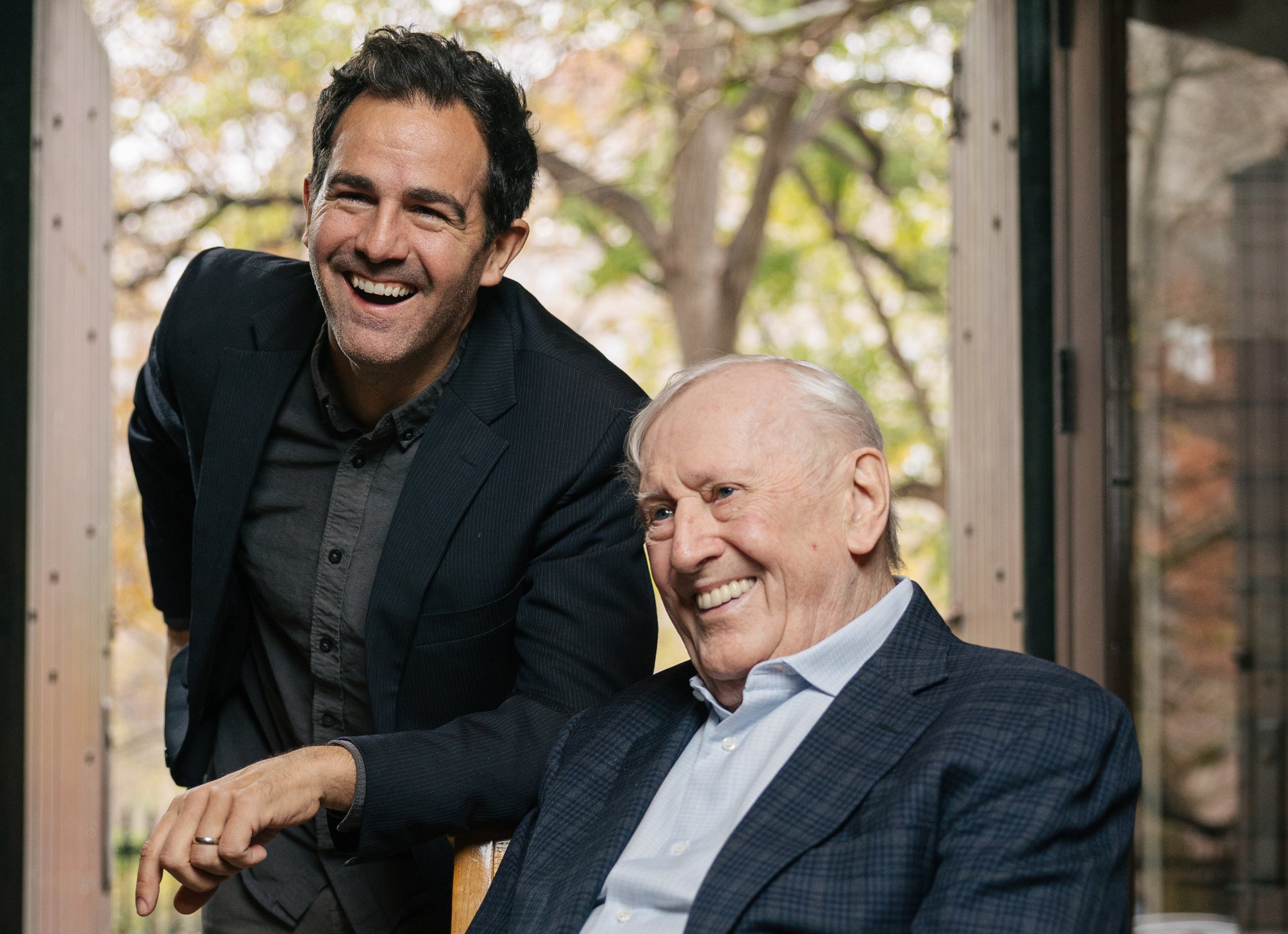TUESDAYS WITH MORRIE
By Jeffrey Hatcher & Mitch Albom
Based on the book by Mitch Albom
Directed by Erwin Maas
Starring Len Cariou and Christopher J. Domig
A Production of Sea Dog Theater
at St George’s Episcopal Church
Reviewed by David Spencer
I was surprised, looking into the old review archive, to find that my reaction to the first off-Broadway production of Tuesdays With Morrie was, though quite positive, somewhat muted. What I originally wrote, slightly abridged, was this:
The play is co-adapted by Jeffrey Hatcher and sportswriter Mitch Albom from Albom’s by-now famous book, an account of how he became reacquainted with his college sociology professor, Morrie Schwartz, upon hearing that the man would be dying…how he became a regular Tuesday visitor, to help Morrie along, benefit from his wisdom, and learn about living a better life through watching Morrie face death with grace.
If you saw the teevee movie, starring Hank Azaria and Jack Lemmon as Mitch and Morrie, it’s interesting to see how a much more suggestive, black box interpretation, featuring only the two actors […] essentially leaves the same impression. Which is one of feelgood sentimentality. In the end, the story really is about nothing more than those two guys, and everything else is forgettable anyway. You might even have a nice cry.
And I’m not knocking it. There’s a real place for such fare, and its key lies in the particulars of the characters–in this case the touchy-feely old man with Yiddishkeit and the too-reserved, wound-up young man.
But if you’re looking for meat or profundity, that’s not to be found. The sum total of Morrie’s wisdom is nothing more than an adjuration to live life to the fullest. It may indeed be important for people to know that death is best faced with simplicity, candor, love and forgiveness…but the notion that Morrie was some philosophical guru just doesn’t wash. (It’s like the old joke about the guy who gives up wealth, family, health and everything to travel to the Himalayas and climb the highest peak to get the secret of life from the Tibetan Master, who intones: “Life is a fountain.” And when the guy becomes infuriated, the Master goes, “You mean life isn’t a fountain?”)
“Tuesdays With Morrie” isn’t a fountain either. But it’s a nicely human story about two men who need each other bonding at a critical juncture in their lives.
If you expect no more of it than that, it will not disappoint.
Which in a way remains absolutely true. But something new has been added in the revival currently being presented by the off-off Broadway comnpany Sea Dog Theater. And it’s that Morrie is being played by Len Cariou.
Cariou is just one of those great actors you almost never catch acting; even when the production is stylized, his mere entrance conveys gravitas and depth—by which I don’t mean solemnity; he can also deliver with a gossamer touch, whether it’s a brilliantly timed comic riposte or a quiet reaction of mixed, difficult emotions (all of which he can make palpable with a change of expression). But like all of that rare breed, he’s at his most virtuosic—and I’m not being glib here—when he’s not called upon to do anything but show up. He a;ways has an innate understanding of the man he’s supposed to portray…and then just is him. Cariou’s toolkit provides that rare combination of meticulous craft, reflexive in-the-moment instinct and life experience which can even be underestimated because he makes it seem utterly natural and easy.
Combine all that with the insistence of charisma…and suddenly those same Morrie homilies are infused with genuine profundity after all. And it’s not the literal wisdom that’s changed. What’s changed is how deeply Morrie—Cariou’s Morrie—cares about what he’s saying.
As Albom, Christopher J. Domig (who is also Sea Dog’s artistic director) is an excellent foil for Cariou, and does a nice job with the transition of his character from a guy so driven by having found his niche in life that he’s trapped by it…to a fellow who begins to see that allowing himself to be vulnerable releases him from confinement, and makes what he has even richer.
Erwin Maas has directed sensitively and efficiency; though there are times when the play’s naturalism is at odds with the dimensions, available lighting and bouncing soundscape of the playing space—St George’s Episcopal Church (209 East 16th Street)—and in that wise he and his actors can only do the best they can; which mostly, and here necessarily, means accepting it and adapting to it without conspicuously trying to wrangle it.
And after all (says the diehard atheist)…why shouldn’t a piece like this (about two Jews) with a cast like that celebrate the universality of the human spirit in a place of worship? It only adds to what makes this small production so hugely resonant.
